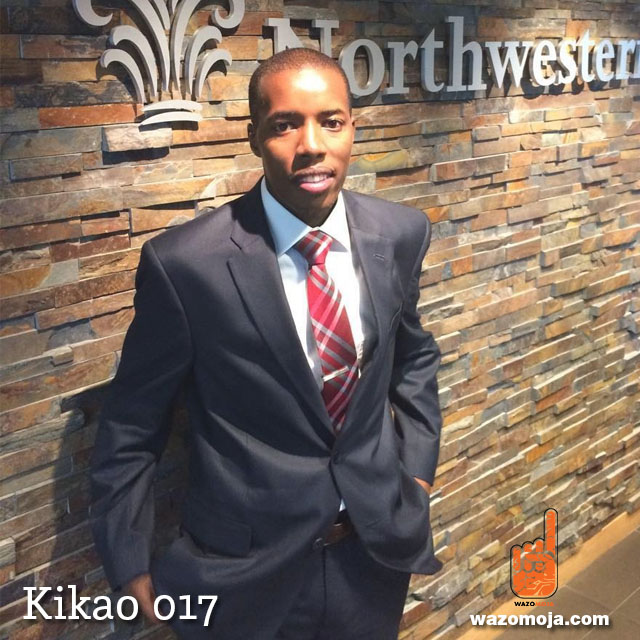Interview: Achieving Financial Independence in Kenya

Some of the short term and immediate recommendations that we have been advising people is to save by spending less. So everyone needs to look for areas where they can save a coin or two.
NAIROBI, Kenya, June 26, 2020/-- Personal finance management is tough at this time, bundled with the corona virus pandemic people's financial lives have been turned upside down. We caught up with Eric Barimbui, an expert in this field and put him to task. We wade through financial independence strategies, redundancies to Kenya's economic outlook.
Let Kikao begin...
[Question 1] Eric, welcome to Kikao. Tell us more about yourself.
My name is Eric Muthomi Barimbui, I am a full time father and husband, lol, however my passion is in Personal Finance, and thus I work as a financial Consultant. My career as a Financial consultant started 5 years ago in the United States where I worked with an organization called Northwestern Mutual, I then transitioned to Kenya. My work as a financial consultant involves working with Individuals, Families, Groups (Chamaas), NGOs and Corporates, focusing mainly on their Savings, Investments and Risk Management needs.
[Question 2] It has not been business as usual in Kenya in the recent past and the COVID-19 pandemic has complicated matters for the average Kenyan. In this era, what financial independence strategies can one adopt to cope?
I think Covid-19 has been an eye opener to many Kenyans especially on their personal finances both positively and negatively. People have woken up to the realization that job stability & security is largely inexistent in many different industries, even those that were considered to be quite secure.
Secondly, we have woken up to the realization of our extravagant spending habits as Kenyans especially in things that we consider entertainment.
These realizations are good and bad, the good thing they are opportunities for us as Kenyans to change our financial habits for better.
Some of the short term and immediate recommendations that we have been advising people is to save by spending less. So everyone needs to look for areas where they can save a coin or two.
Then, it is crucial that with the money saved, they establish emergency funds, rainy day funds and sinking funds. Over the long term, then they need to find ways of establishing multiple streams of income with a goal of eventually investing in avenues that afford them portfolio income and thus being completely financially free.
[Question 3] You have experience in the American financial industry, are there parallels with the Kenyan?
I think, all people have the same dreams and goals for themselves, their children and loved ones. This cuts across all people and races regardless of geographical location. However, I wish Kenyans would be more open to seek professional financial counsel, and engage financial consultants more openly.
You find that in other areas Kenyans have no problem consulting, for instance one will very easily hire an architect before constructing a house, talk to their pastor for spiritual matters, or a doctor for health issues, but when it comes to finances, we are all our own best financial advisors, or we consult our parents and relatives who might not even have sound and credible financial information regarding savings and investments.
[Question 4] Redundancies are currently becoming a norm. What’s an effective approach for both the employers and employees?
This is a very sad reality that is starting to emerge. It is quite hard, really to advice people on what to do when facing job loss, especially if it has already happened. However, it is important that we learn how to be flexible, and be willing to get uncomfortable so that when such occurs we can quickly move on and find new ways of making money. It is also important that regardless of what or where we are employed that we develop multiple sources of income so that when we lose one (job loss) then we are not totally crippled. I have a mentor who is a senior engineer with a power company in Kenya, but regardless of his good salary, he teaches a class every evening, and runs a restaurant, butchery and car wash along the by pass. This individual, even if his boss was to declare him redundant, wouldn’t be affected. Last but not least, just because you trained as a medical doctor, doesn’t mean that you can only make a living as a doctor, start a business, learn sales, etc. Do not let your ‘fancy degree’ tie you down to unemployment or worse under employment.
[Question 5] Your Favourite Financial Advisor. Give us a glimpse of the training that you offer.
Hehehehehehe. Well, I do consider myself a teacher actually, like how we had a favorite teacher, I want to be my clients’ favorite financial consultant by being honest, factual and informed. My training mainly focus on strategies that one can use to achieve total financial freedom starting with learning the right financial habits to develop and employ in their day to day lives, learning how to manage their finances, learning how to develop multiple sources of income, and finally invest to be able to earn from portfolio income. It is quite an eye opening financial course, I would encourage you and all to take the class.
[Question 6] Is Kenya’s economic future bleak? Should investors remain hopeful?
The future is bright for those who are well prepared both with knowledge and resources.
[Question 7] What advice would you give your younger self?
Get more mentors, the right mentors, take more risks, and develop deeper and meaningful networks.
The written interview was compiled by Phineahs Munene – Co-founder of Wazo Moja for Eric Muthomi – of Peak Point Consulting
Distributed by Wazo Moja on behalf of Peak Point Consulting
SOURCE
Peak Point Consulting



